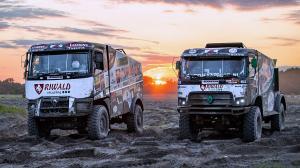The second battery will increase performance and reduce emissions
6.9.2021
 The North Bohemian team MKR Technology has completed another intensive testing of Dakar trucks. Last week, the designers spent several days on a sandy surface in Poland. And the main goal of testing of the hybrid special truck was to focus on improving suspension, improving cooling and, in particular, increasing performance and reducing emissions. Team boss Mario Kress is excited about the new challenges.
The North Bohemian team MKR Technology has completed another intensive testing of Dakar trucks. Last week, the designers spent several days on a sandy surface in Poland. And the main goal of testing of the hybrid special truck was to focus on improving suspension, improving cooling and, in particular, increasing performance and reducing emissions. Team boss Mario Kress is excited about the new challenges.
"We have made a large number of major technical adjustments. The biggest is definitely the installation of a second battery with a larger capacity, thanks to which we can save the diesel engine, we are increasing performance by two hundred horse power, but at the same time we are significantly reducing emissions. We are successfully following a new path, but no development is happening on flat smooth asphalt. We are in the field here, so every major modification also brings its new problems. We have a few more weeks ahead of us to make the system as reliable as possible” says Mario Kress, lead designer and head of the MKR Adventure project, which prepares racing trucks for long-distance competitions.
The North Bohemian designers went to Poland with two Renaults of the Dutch racing team Riwald Dakar. So the pilots Gert Huzink and Pascal de Baar were driving those trucks. And it was Huzink's hybrid special truck that was the main focus. The truck received a second battery, and two hundred more horsepower came with it. "We supported the operation of the electric motor at the expense of a conventional unit. We save the engine and extend its reliability this way. The reduction in diesel engine power is directly related to the reduction in emissions. So we go hand in hand with the planned improvement of environmental impacts," said Mario Kress.
Kress' team also focused on better overall cooling. They have been fighting high temperatures and overheating for a long time, which then reduces the reliability and service life of the systems. The big challenge is the cab suspension. The trucks receive new springs on both the front and rear axles. "We have been waiting for these parts for over two months. Delayed deliveries slow us down a bit. We would need to go at a faster pace. The tests showed how the suspension strongly affected the performance as such. We are happy about it and we will continue to work on it," said Mario Kress.
The application of the news therefore brought with it a number of positive results. "The pilots are satisfied. It is now up to us to solve and test reliability. In the end, we always have to compromise, because it is not possible to increase performance at the expense of longevity. We have three or four weeks of work ahead of us and then new testing,” Mario Kress from MKR Technology is planning.













